Related Research Articles

John Donne was an English poet, scholar, soldier and secretary born into a recusant family, who later became a cleric in the Church of England. Under royal patronage, he was made Dean of St Paul's Cathedral in London (1621–1631). He is considered the preeminent representative of the metaphysical poets. His poetical works are noted for their metaphorical and sensual style and include sonnets, love poems, religious poems, Latin translations, epigrams, elegies, songs, and satires. He is also known for his sermons.
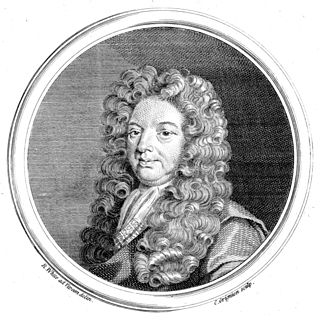
John Blow was an English Baroque composer and organist, appointed organist of Westminster Abbey in late 1668. His pupils included William Croft, Jeremiah Clarke and Henry Purcell. In 1685 he was named a private musician to James II. His only stage composition, Venus and Adonis, is thought to have influenced Henry Purcell's later opera Dido and Aeneas. In 1687 he became choirmaster at St Paul's Cathedral, where many of his pieces were performed. In 1699 he was appointed to the newly created post of Composer to the Chapel Royal.

Psalm 51, one of the penitential psalms, is the 51st psalm of the Book of Psalms, beginning in English in the King James Version: "Have mercy upon me, O God". In the slightly different numbering system used in the Greek Septuagint and Latin Vulgate translations of the Bible, this psalm is Psalm 50. In Latin, it is known as Miserere, in Ancient Greek: Ἥ Ἐλεήμων, romanized: Hḗ Eleḗmōn), especially in musical settings. The introduction in the text says that it was composed by David as a confession to God after he sinned with Bathsheba.

"Christ the Lord Is Risen Today" is a Christian hymn associated with Easter. Most of the stanzas were written by Charles Wesley, and the hymn appeared under the title "Hymn for Easter Day" in Hymns and Sacred Poems by Charles and John Wesley in 1739. The hymn eventually became well known for the "Alleluia" sung as a melisma after each line, which was added by an unknown author, probably to fit the commonly used hymn tune, "Easter Hymn". It remains a traditional processional hymn on Easter Sunday.

A troparion in Byzantine music and in the religious music of Eastern Orthodox Christianity is a short hymn of one stanza, or organised in more complex forms as series of stanzas.

A Christian child's prayer is Christian prayer recited primarily by children that is typically short, rhyming, or has a memorable tune. It is usually said before bedtime, to give thanks for a meal, or as a nursery rhyme. Many of these prayers are either quotes from the Bible, or set traditional texts.
Pelham Humfrey was an English composer. He was the first of the new generation of English composers at the beginning of the Restoration to rise to prominence.

"Herzliebster Jesu" is a Lutheran Passion hymn in German, written in 1630 by Johann Heermann, in 15 stanzas of 4 lines, first published in Devoti Musica Cordis in Breslau. As the original headline reveals, it is based on Augustine of Hippo; this means the seventh chapter of the so-called "Meditationes Divi Augustini", presently ascribed to John of Fécamp.

"O Sacred Head, Now Wounded" is a Christian Passion hymn based on a Latin text written during the Middle Ages. Paul Gerhardt wrote a German version which is known by its incipit, "O Haupt voll Blut und Wunden".

The Holy Sonnets—also known as the Divine Meditations or Divine Sonnets—are a series of nineteen poems by the English poet John Donne (1572–1631). The sonnets were first published in 1633—two years after Donne's death. They are written predominantly in the style and form prescribed by Renaissance Italian poet Petrarch (1304–1374) in which the sonnet consisted of two quatrains and a sestet. However, several rhythmic and structural patterns as well as the inclusion of couplets are elements influenced by the sonnet form developed by English poet and playwright William Shakespeare (1564–1616).
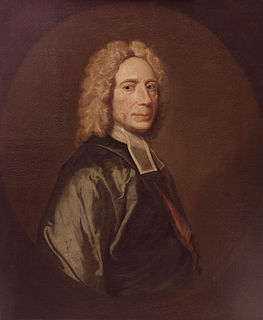
"Our God, Our Help in Ages Past" is a hymn by Isaac Watts in 1708 that paraphrases the 90th Psalm of the Book of Psalms. It originally consisted of nine stanzas; however, in present usage the fourth, sixth, and eighth stanzas are commonly omitted to leave a total of six. In 1738, John Wesley in his hymnal, Psalms and Hymns, changed the first line of the text from "Our God" to "O God". Both Watts' wording and Wesley's rewording remain in current use.
Great Is Thy Faithfulness is a popular Adventist Christian hymn written by Thomas Chisholm (1866–1960) with music composed by William M. Runyan (1870–1957) in Baldwin City, Kansas, U.S.

Psalm 10 is the tenth psalm of the Book of Psalms, beginning in English in the King James Version: "Why standest thou afar off, O LORD? why hidest thou thyself in times of trouble?" In the Greek Septuagint and the Latin Vulgate, it is not an individual psalm but the second part of psalm 9, "Ut quid Domine recessisti". These two consecutive psalms have the form of a single acrostic Hebrew poem. Compared to Psalm 9, Psalm 10 is focused more on the individual than the collective human condition.
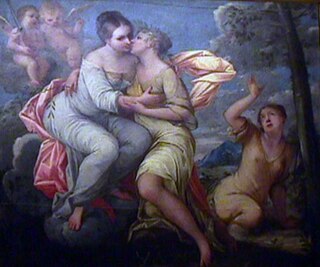
Psalm 85 is the 85th psalm of the Book of Psalms, beginning in English in the King James Version: "LORD, thou hast been favourable unto thy land". In the Greek Septuagint version of the Bible, and in the Latin Vulgate, this psalm is Psalm 84 in a slightly different numbering system. In Latin, it is known as "Benedixisti Domine terram tuam". In Judaism, it is called "a psalm of returned exiles". The psalm is attributed to the sons of Korah.
Psalm 86 is the 86th psalm of the Book of Psalms, beginning in English in the King James Version: "Bow down thine ear, O Lord, hear me". In the Greek Septuagint version of the Bible, and in the Latin Vulgate, this psalm is Psalm 85 in a slightly different numbering system. In Latin, it is known as "Inclina Domine".

"Was willst du dich betrüben" is a hymn in seven stanzas by the German Baroque poet, Lutheran minister and hymn-writer Johann Heermann. The chorale was first published in 1630 during the Thirty Years' War. It is focused on trust in God, even when facing adversaries.
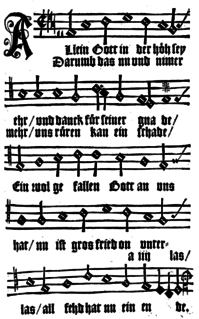
"Allein Gott in der Höh sei Ehr" is an early Lutheran hymn, with text and melody attributed to Nikolaus Decius. With the reformers intending church service in German, it was intended as a German version of the Gloria part of the Latin mass, used in almost every service. Decius wrote three stanzas, probably in 1523, while a fourth was added, probably by Joachim Slüter.
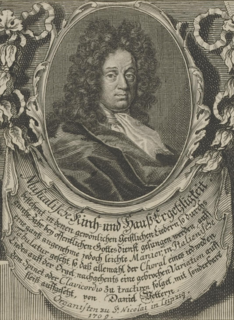
"Liebster Gott, wann werd ich sterben" is a Lutheran hymn which Caspar Neumann, an evangelical theologian from Breslau, wrote around 1690. The topic of the hymn, which has five stanzas of eight lines, is a reflection on death. An elaborate analysis of the hymn's content was published in 1749. A few text variants of the hymn originated in the 18th century. Neumann's text is usually sung to the hymn tune of "Freu dich sehr o meine Seele".
"Sonnet II", also known by its opening words as "As Due By Many Titles", is a poem written by John Donne, who is considered to be one of the representatives of the metaphysical poetry in English literature. It was first published in 1633, two years after Donne’s death.

Canticle IV: The Journey of the Magi, Op. 86, is a composition for three male solo voices and piano by Benjamin Britten, part of his series of five Canticles. It sets the text of T. S. Eliot's poem "Journey of the Magi", retelling the story of the biblical Magi. The work was premiered in June 1971 at the Aldeburgh Festival by James Bowman, Peter Pears and John Shirley-Quirk, with Britten as the pianist. It was published the following year, dedicated to the three singers.
References
| Wikisource has original text related to this article: |
- ↑ Grierson, Herbert, ed. (1933). Donne: Poetical Works. Oxford University Press. pp. 337–338.
- ↑ Pelham Humfrey: A Hymn to God the Father (Harmonia Sacra, Book 1, 1688) at AllMusic . Retrieved 26 May 2017.
- ↑ A performance on You Tube
- ↑ "Wilt Thou Forgive That Sin, Where I Begun". Hymnary.org . Retrieved 26 May 2017.
- ↑ A performance on You Tube
- ↑ Lieder.net
- ↑ "Hymn to God, the Father by John Donne". Slideshare.net. Retrieved 25 October 2017.
- ↑ "Purcell - Humfrey". medieval.org. Retrieved 26 May 2017.
- ↑ John Shirley-Quirk - Purcell*, Butterworth*, Humfrey*, Moeran* - Martin Isepp, Nona Liddell, Ivor McMahon, Ambrose Gauntlett – A Recital Of English Songs at Discogs (list of releases)
- ↑ "Lovesongs & Sonnets of John Donne and Sir Philip Sidney". discogs.com . Retrieved 26 February 2021.
- ↑ "Hymn to God the Father". Hyperion Records . Retrieved 26 May 2017.
